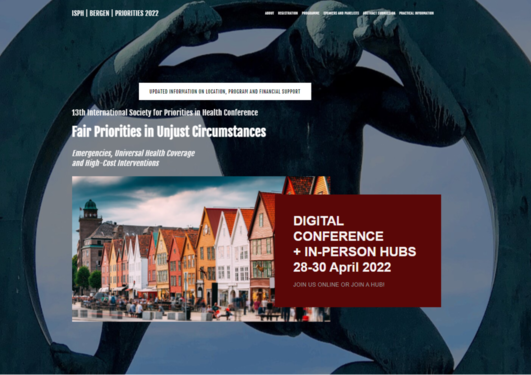Global Health Master's students at the ISPH Priorities 2022 Conference
From 28-30 April 2022, the 13th International Society for Priorities in Health (ISPH) Conference was organised as an innovative digital event with local and regional hubs.

Hovedinnhold
An innovative hybrid event
The 13th International Society for Priorities in Health (ISPH) Conference was streamed live from Bergen, Norway, and people could attend it in person at the Bergen Hub, or online through a user-friendly platform. However, the innovation lies in having more than 10 hubs spread across the globe, from Malawi to Washington, with people gathered in hospitals, research institutions, and conference centres. During the breaks, participants and panellists could interact physically at their own hub, or virtually through the online platform.
The first two days were a combination of plenaries, parallel sessions, and poster presentations. The last day was fully dedicated to priority setting for the achievement of universal health coverage (UHC). A broad range of professionals participated in the conference, including ethicists, philosophers, anthropologists, economists, healthcare workers, lawyers, and politicians. This diversity made the conference much more vibrant and interesting. Some students worked as technical hosts for the online poster presentations, and all of them were there to listen, discuss, and learn.
Master's student participation at the Bergen Hub
Three students currently studying for a Master's degree in Global Health at the University of Bergen attended the ISPH Conference for the first time and have shared some of their impressions from the Bergen Hub.
Ferdausi Maheen, physical therapist from Bangladesh:
“As a health professional, attending this conference is an excellent opportunity for learning about priorities in health from the experts of different parts of the world. Living in one of the lower middle-income countries and being involved with the health services directly for many years, I have experienced that setting priorities in the health care sector is imperative. Through this conference I have gained some practical knowledge about Universal Health Coverage and learned how to set achievable goals and priorities. I am sure that this ISPH Conference will help us move toward UHC and improve health sectors’ policies in LMICs e.g., in Bangladesh.”
Jasmine Maharjan, registered nurse from Nepal:
“In my view the conference was beneficial to me. We have spent the last year learning about UHC, how to achieve it and why it is so important, but I was not truly clear about the challenges countries are facing when trying to implement it. Hearing about challenges faced by our PhD students during the process of adapting UHC at both ministry and ground-level were remarkably interesting. This conference has provided insight towards probable issues that may arise in countries trying to achieve UHC in the future as well as motivation for people like us to think about UHC.”
Ingrid Azevedo, medical doctor from Brazil:
“A remarkable moment at the ISPH Conference for me was the welcome speech given by Dr. Viktor Liashko, the Health Minister of Ukraine. He highlighted how the priorities in health systems can quickly change due to extreme events and how challenging it is to be prepared for them. In the context of health systems, I have learned that it is important to have all the stakeholders involved when deciding which criteria will be used to set priorities. Keeping the process transparent and accountable eases dealing with any unintended consequences. I enjoyed the diversity of themes discussed at the conference, ranging from achieving UHC and defining essential health packages to the moral distress faced by the healthcare workers during the COVID-19 pandemic.
Overall, the conference has opened my eyes to the value of a systematic decision-making process, being it on clinical practices, public policies or in global health.
NB: If you registered for the 2022 event and could not attend all the sessions you wanted, the recordings will be available via the conference portal (check your personal link) until April 2023.
